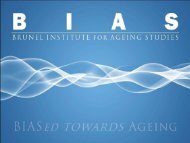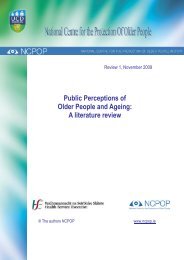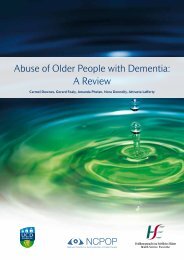Public Perceptions of Older People A literature review
Review 1 PP OP.pdf - National Centre for the Protection of Older ...
Review 1 PP OP.pdf - National Centre for the Protection of Older ...
Create successful ePaper yourself
Turn your PDF publications into a flip-book with our unique Google optimized e-Paper software.
sketches <strong>of</strong> elderly people drawn by a sample <strong>of</strong> students lacked clear<br />
depictions <strong>of</strong> gender. These images were explained by students as reflections<br />
<strong>of</strong> the stereotype <strong>of</strong> older people as sexless, lacking sexual desire, interest,<br />
ability, and activity. This stereotype <strong>of</strong> older people has been reported in other<br />
studies (Kimuna et al. 2005; Arnold-Cathalifaud et al. 2008). Any sexual<br />
behaviour in older people is generally negatively perceived and deemed as<br />
unacceptable by the public (Kane 2006).<br />
<strong>Older</strong> women in particular, are more likely to be perceived as non-sexual. For<br />
example, Arnold-Cathalifaud et al. (2008) found from a sample <strong>of</strong> young<br />
people surveyed, 69% tended to consider elderly woman ‘sexually inactive’,<br />
compared to 62% for elderly men. Similarly, Kane (2006) reported that<br />
perceptions surrounding older males who engaged in sexual behaviours were<br />
generally negative but judgments on this were much harsher for older<br />
women. On the whole, older people are generally stereotyped as asexual and<br />
sexless. Sexual activity among the elderly is frowned upon and deemed<br />
unacceptable, particularly for older women.<br />
7.5.1.4 Mental decline<br />
A decline in mental ability is perceived as inevitable in older people and is<br />
another commonly reported stereotype associated with ageing (Palmore<br />
1999). This stereotype believes that age reduces competence, intelligence,<br />
ability, and results in memory loss (Kite et al. 2005). Musaiger and D’Souza<br />
(2009) noted the importance <strong>of</strong> mental alertness in defining older age. They<br />
found that most respondents agreed that the elderly tend to have decreased<br />
learning capability, and that older people become confused, forgetful, and<br />
cannot remember or learn new things (Musaiger & D’Souza 2009). Cuddy et<br />
al. (2005) found that older people are rated as less intellectually competent<br />
than younger people. Furthermore, people are more likely to attribute<br />
memory failure in older adults to intellectual incompetence, while memory<br />
failures in younger adults are <strong>of</strong>ten attributed to lack <strong>of</strong> attention or effort<br />
(Erber et al. 1992; Erber et al. 1996; Erber & Prager 1999).<br />
In Arnold-Cathalifaud et al.’s (2008) study, students were asked to estimate<br />
an age for three categories: senior citizens, elderly men and elderly women.<br />
Senior citizens were perceived to be significantly younger than elderly men<br />
and women and were subsequently rated better on a number <strong>of</strong> competence<br />
related domains. For example, 43% <strong>of</strong> participants considered senior citizens<br />
17









